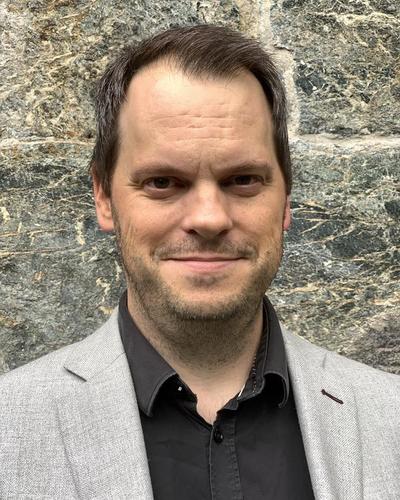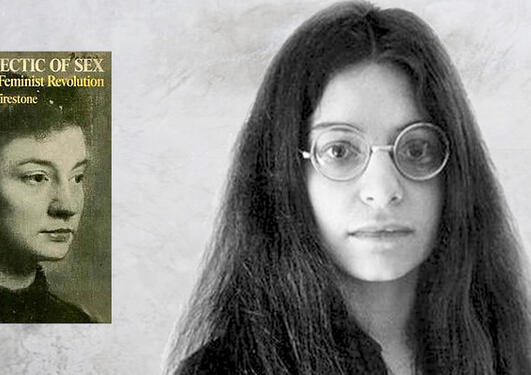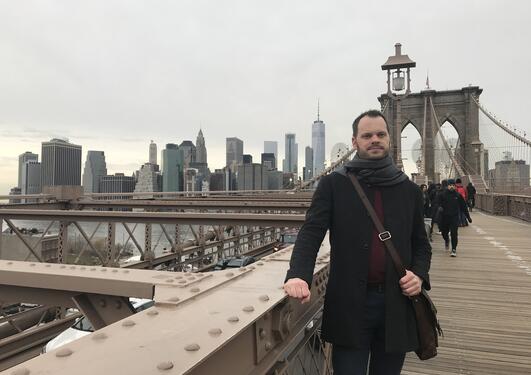- E-mailclaus.halberg@uib.no
- Visitor AddressParkveien 9Ida Bloms hus5007 Bergen
- Postal AddressPostboks 78055020 Bergen
I am a postdoctoral fellow at the Centre for Women’s and Gender Research and the project leader of the EU-funded project FEMSAG: Feminist Theory After Sex and Gender. I have a doctoral degree in philosophy and gender research from the University of Bergen.
My doctoral thesis, “The Labour of the Feminine in Merleau-Ponty’s Philosophy of Nature”, was a study of the work of French phenomenological philosopher Maurice Merleau-Ponty (1908-1961) with a view to the philosophical function of what I call feminine textual motifs in Merleau-Ponty’s descriptions and conceptualizations of nature and of nature as experienced. Both the topic and the interpretative approach in the thesis was to that extent inspired by Luce Irigaray (b. 1937), a French feminist philosopher, linguist and psychoanalyst of the intellectual generation after Merleau-Ponty.
Since earning my doctoral degree I have continued working on these topics – phenomenology, nature, and gender – but in more differentiated ways. I have published articles in which I look at how phenomenology can contribute productively to more natural-scientific research projects, such as research on the origins of life and cognitive neuroscience.
My current research is based in philosophy of science and science criticism and looks at the understanding(s) of gender and gender differences in the light of two distinct yet related problematics: the nature vs. nurture problematic within the philosophy of biology, and the mind vs. brain problematic within the philosophy of mind and cognitive science.
In this connection I look particularly at the philosophical foundations of attempts to demonstrate and explain gender differences in cognition, emotion and behavior through the vocabularies of evolutionary psychology, genetics, neurobiology and cognitive psychology. An underlying thematic in my scholarly work on these questions is the potential and the limits of a reconciliation of feminist theory and philosophical naturalism, two intellectual traditions that have historically been seen as opposed to one another.
Refereed conference papers:
“(En)activel Debunking Neurosexis: The Case for an Alliance Between Neurofeminism and Enactivism”. Presented at the conference BIAS In AI and Neuroscience: Transdisciplinary conference, University of Radboud, Nijmegen, 17-19 June, 2019.
“Transgendering the Merleau-Pontian Body: Not Necessarily an Easy Task”. Presented at the 43rd annual meeting of The International Merleau-Ponty Circle, University of Tennessee at Chattanooga, Chattanooga, TE, 8-10 November, 2018.
“Enactively (En)gendering Emotion: The Case for a Mutual Alliance Between Neurofeminism and Enactivism”. Presented at SLSA – Out of Mind, the 32nd annual meeting of the Society for Literature, Science, and the Arts, co-organized by The University of Waterloo, York University, OCAD University, and Rochester Institute of Technology, Toronto, 15-18 November, 2018.
“Is Karen Barad a Naturalist?”. Presented at the 57th annual meeting of the Society for Phenomenology and Existential Philosophy, Pennsylvania State University, State College, PA, 18-20 October, 2018.
“Feminism, Force and Finitude: (Mis)understanding Elizabeth Grosz’s Darwinian Reflections on Life, Politics, and Art”. Presented at Biopower, Biologics, Biospheres: philoSOPHIA 2018, the 12th annual meeting of philoSOPHIA: Society for Continental Feminism, University of Richmond, Richmond, VA, 22-24 March, 2018.
”Origins without causes: The phenomenological discourse on the origin of life and mind.” Presented at the biannual conference of the International Society for the History, Philosophy, and Social Studies of Biology, Université du Québec à Montréal, 5-10 July, 2015.
”Deleuze contra phenomenology: Differences that make a difference.” Presented at Daughters of Chaos, the 8th annual conference of Deleuze Studies, Stockholm, 29 June-1 July, 2015.
”If the Reversibility of the Flesh is the Answer, What, Then, Was the Question? In Search of the Question at the Heart of Merleau-Ponty's Fundamental Thought.” Presented at At the Limits of Phenomenology: 12th Annual Meeting of the Nordic Society for Phenomenology, Helsinki, Finland, 24-26 April, 2014.
”Sexual Difference, Sexuate Difference.” Presented at Self and Other: 5thAnnual Meeting of the Nordic Society of Phenomenology, University of Copenhagen, 20-22 April, 2007.
Guest lectures
”Thinking Emergence at the Interface Between Phenomenology and Biology: Some Recent Contributions.” Guest lecture at Centre d'Ethique Contemporaine, Université Paul Valéry, Montpellier, 20 June, 2014.
”Merleau-Ponty's Philosophy of Nature: Naturalizing Phenomenology or Phenomenalizing Nature?” Guest lecture at Centre d'Ethique Contemporaine, Université Paul Valery, Montpellier, 17 June, 2014.
Keynote
”Flesh as Desire.” Keynote address at the conference In Memory of Maurice Merleau-Ponty: Environment, Embodiment and Gender, Universitety of Bergen, 30 October, 2008.
Popular-scientific presentations/presentations in non-academic contexts:
”Ghost by Kader Attia.” Speech at the opening of the exhibition of Kader Attia's installation Ghost at Galleri 3.14, Bergen, 27 March, 2015.
”Kjønn i rommet mellom ‘født sånn’ og ‘blitt sånn:’ Noen påminnelser fra Simone de Beauvoirs Det annet kjønn [Gender in the space between 'nature' and 'nurture': Some reminders from Simone de Beauvoir's The Second Sex]” Forum for feminisme og queer teori, Alléhjørnet, Bergen, 7 May, 2012.
”Fallogosentrisme? Luce Irigaray og den feministiske kritikken av filosofien [Phallogocentrism? Luce Irigaray and the feminist critique of philosophy]” Feministisk forskningscafé, Arkeologisk museum, Stavanger, 27 March, 2007.
Various communications
“Neurosexism, Neurofeminism, and the Limits of Neuroplasticity”. Open seminar at the Centre for Women's and Gender Research, University of Bergen, 16 January, 2019.
“Is Karen Barad a Feminist Naturalist?” Open seminar at the Centre or Women's and Gender Research, 11 January, 2018.
“Rethinking partner choice, cooperation, and parental investment: Perspectives from evolutionary biology and feminist science studies”. Presentation given in collaboration with postdoctor Adele Mennerat at the Centre for Women's and Gender Research, 22 October, 2015, on the occasion of Det nasjonale kontaktmøtet for kjønnsforskning.
”‘The Light Which, Illuminating the Rest, Remains at Its Source in Obscurity’: In Search of the Question Behind Merleau-Ponty's Thought of Flesh.” Presentation at the seminar The Historicity of Human Existence and the ‘Flesh,’ Department of Philosophy, University of Bergen, 6.-7 February, 2014, on the occasion of the publication of Konrad Rokstad's book Husserl and Merleau-Ponty Inquired Into the Historicity of Human Existence.
”Feminism after Poststructuralism: Grappling With Neurosexism.” Presentation at the seminar Feminism after Poststructuralism: Literature and Philosophy, organized at Litteraturhuset in Bergen in honour of Toril Moi on the occasion of her 60th anniversary, 6 December, 2013.
”Zeigen, Greifen og motorisk intensjonalitet: Problemet om motorikkens ‘grunn’ i Merleau-Pontys analyse av tilfellet Schneider.” Presentation at the Department of Philosophy, University of Bergen, 27 October, 2011.
”Sara Heinämaa’s paper ’Anonymity and Personhood: Merleau-Ponty’s Conception of the Bodily Subject’.” Responsto Sara Heinämaa at the conference Nature, Freedom, History – Merleau-Ponty after Fifty Years, University College Dublin, 22-24 June, 2011.
”Production and Reduction of Difference – Touching on the Double Gesture in Irigaray's Rewriting of Merleau-Ponty's Notion of ‘the Flesh.” Presentation at the seminar Luce Irigaray and the Canon of Philosophy, Universitety of Oslo, 6 November, 2008, on the occasion of the launch of the journal Agora's thematic issue on Luce Irigaray.
”Dekonstruksjon og fenomenologi i Irigarays filosofiske tilnærming til kjønnsforskjellen.” Presentation at the conference Kjønnsforskning NÅ!, University of Bergen, 8-9 September, 2006.
EXPHIL-SVSEM (examen philosophicum)
EXPHIL-JUSEM (examen philosophicum)
EXPHIL-HFSEM (examen philosophicum)
EXFAC00AS (akademisk skriving)
KVIK101 (kvinne- og kjønssteori)
KVIK201 (kvinne- og kjønnsteori)
KVIK206 (kvinne- og kjønnsteori)
Peer-reviewed articles
“Fighting the Good Fight? On some Recent Transcendentalist Objections to ‘Naturalized Phenomenology’.” Études Phénoménologiques – Phenomenological Studies, thematic issue on “Phenomenology and the Challenges from the Philosophy of Mind”, no. 1, 2017, pp. 135-165.
“Emergent Life: Addressing the ‘Ontological Diplopia’ of the 21stCentury with Merleau-Ponty and Deacon”. Discipline Filosofiche, thematic issue on “Merleau-Ponty and the Natural Sciences,” vol. XXIV, no. 2, 2015, pp. 185-215
”Lyset som i sin opprinnelse forblir dunkelt: Irigaray om (kjønns)forskjellens påtagelige usynlighet i Merleau-Pontys Det synlige og det usynlige [The Light Which, Illuminating the Rest, Remains at Its Source in Obscurity: Irigaray on the tangible invisibility of (sexual) difference in Merleau-Ponty's The Visible and the Invisible].” Agora, no. 3, 2008, pp. 134-160.
Other articles
"Do Brain Decoders Have an Ontological Mind of Their Own? Response to Nikolas Rose". Body & Society, vol. 25, no. 4, 2019, pp. 103-120.
“(Ne pas) avoir foi en les choses : le cognitivisme et le fondement abyssal de la vie”. In: Marc-Henry Soulet (ed.), Action et incertitude: Les epreuves de l’incertain, Basel, Schwabe Verlag, 2018.
“Deleuze kontra fenomenologien: Noen avgjørende forskjeller [Deleuze contra phenomenology: Differences that make a difference]”. In: Helge Pettersen, Terje Hellesen og Remi Nilsen (eds.), Deleuze i vest. Bergen: Morgana Press, 2018, pp. 11-33.
“Grappling With Neurosexism.” Tidsskrift for kjønnsforskning, nr. 3-4, 2014, s. 326-331. Published panel presentation given at Feminism after Poststructuralism: Literature and Philosophy, seminar held on the occassion of Toril Moi's 60th anniversary, Litteraturhuset i Bergen, 6 December 2013.
”Fornuft og følelser: Fra tvedeling til tvetydighet” (med Simen A. Øyen). Semikolon,vol. 12, no. 21, 2011, pp. 25-33
“The Tangible Invisible: Irigaray’s Phenomenological Critique of Merleau-Ponty’s Notion of the Flesh.” I: Ane Faugstad Aarø & Johannes Servan (eds.), Environment, Embodiment and Gender, Bergen: HermesText, 2011, pp. 107-131.
”Væren i fri dressur: Om fremmedelementet i Merleau-Pontys fenomenologi.” Prosopopeia, vol. 17, nr. 1, 2010, s. 22-29.
Popular scientific publications, opinion pieces etc.
"Hjernemani som kulturell patologi - og hvordan den kan motvirkes (2)" Salongen - nettidsskrift for filosofi og idéhistorie, 3 June 2021 (available at: https://www.salongen.no/om-hjernemani-som-kulturell-patologi-og-hvordan-... accessed on 3 June 2021)
"Hjernemani som kulturell patologi - og hvordan den kan motvirkes (1)" Salongen - nettidsskrift for filosofi og idéhistorie, 29 May 2021 (available at: https://www.salongen.no/om-hjernemani-som-kulturell-patologi-og-hvordan-... accessed on 31 May 2021)
“Merleau-Ponty og naturens kvinnelige ansikt.” Salongen – nettstedet for filosofi og idéhistorie, 4 March 2014 (available at: http://www.salongen.no/?p=2677; accessed on 12 May 2015)
“Ghost by Kader Attia”. I: The International Difference: Contribution to the Contemporary Art Scene. Utgitt av Galleri 3,14 i Bergen, 2015, s. 165.
“Hjernevask-teorien om hjernekjønn er kanskje mindre naturalistisk enn den gir seg ut for å være.” Commentary in Morgenbladet, no. 11, 13 March 2015, pp. 18-19 (available at: http://morgenbladet.no/debatt/2015/hjernetov#.VQVx10LxGB8; accessed on: 31 May 2021)
“Kjønn på hjernen: Historien om en gjenstridig pseudovitenskapelig hypotese.” Samtiden, no. 1, 2014, pp. 64-78.
- (2022). «Natur» er også et ord: Om å ta natur på alvor i feministisk teori. Tidsskrift for kjønnsforskning. 72-84.
- (2022). Neurosexism, Neurofeminism, and Neurocentrism: From Gendered Brains to Embodied Minds. NORA - Nordic Journal of Feminist and Gender Research.
- (2019). Do Brain Decoders Have an Ontological Mind of Their Own? Response to Nikolas Rose. Body & Society. 103-120.
- (2017). Fighting the Good Fight? On Some Recent Transcendentalist Objections to “Naturalized Phenomenology”. Études phénoménologiques --- Phenomenological Studies. 135-165.
- (2014). Grappling With Neurosexism. Tidsskrift for kjønnsforskning. 326-331.
- (2014). Emergent Life: Addressing the 'Ontological Diplopia' of the 21st Century with Merleau-Ponty and Deacon. Discipline filosofiche. 185-215.
- (2014). Cognition and Emotion: From Dichotomy to Ambiguity. Analecta Husserliana :The Yearbook of Phenomenological Research. 473-484.
- (2008). Lyset som i sin opprinnelse forblir dunkelt. Irigaray om (kjønns)forskjellens påtagelige usynlighet i Merleau-Pontys Det synlige og det usynlige. Agora. 134-160.
- (2015). Partner choice, cooperation, and parental investment: perspectives from evolutionary biology and feminist science studies.
- (2014). '...lik den konstante larmen fra en storby': Utsidens instans i Merleau-Pontys persepsjonsfenomenologi.
- (2012). Kjønn i rommet mellom "født sånn" og "blitt sånn": Noen påminnelser fra Simone de Beauvoirs Det annet kjønn.
- (2007). Fallogosentrisme? Luce Irigaray og den feministiske kritikken av filosofien.
- (2015). Origins without causes: The phenomenological discourse on the origins of man.
- (2015). Deleuze contra phenomenology: Differences that make a difference.
- (2014). Thinking Emergence at the Interface Between Phenomenology and Biology: Some Recent Contributions.
- (2014). Merleau-Ponty's Philosophy of Nature: Naturalizing Phenomenology or Phenomenalizing Nature?
- (2014). If the Reversibility of the Flesh is the Answer, What, Then, Was the Question? In Search of the Question at the Heart of Merleau-Ponty's Fundamental Thought.
- (2014). 'The Light Which, Illuminating the Rest, Remains at Its Source in Obscurity': In Search of the Question Behind Merleau-Ponty's Thought of Flesh.
- (2013). Feminism After Poststructuralism: Grappling with Neurosexism.
- (2011). Zeigen, Greifen og motorisk intensjonalitet: Problemet om motorikkens "grunn" i Merleau-Pontys analyse av tilfellet Schneider.
- (2008). Production and Reduction of Difference - Touching on the Double Gesture in Irigaray's Rewriting of Merleau-Ponty's Notion of "the Flesh".
- (2008). Mimesis and Polemics in Irigaray's Reading of Merleau-Ponty.
- (2008). Flesh as Desire.
- (2007). Sexual difference, sexuate difference.
- (2006). Dekonstruksjon og fenomenologi i Irigarays filosofiske tilnærming til kjønnsforskjellen.
- (2014). Kjønn på hjernen: Historien om en pseudovitenskapelig hypotese. Samtiden. Tidsskrift for politikk, litteratur og samfunnsspørsmål. 64-78.
- (2011). Fornuft og følelser - fra tvedeling til tvetydighet. Semikolon. Tidsskrift for Idehistorie, Semiotik og Filosofi. 25-35.
- (2010). Væren i fri dressur: om fremmedelementet i Merleau-Pontys fenomenologi. Prosopopeia. 22-29.
- (2015). Hjernevask-teorien om hjernekjønn er kanskje mindre naturalistisk enn den gir seg ut for å være. Morgenbladet. 18-19.
- (2013). The Labour of the Feminine in Merleau-Ponty's Philsophy of Nature.
- (2019). (Ne pas) avoir foi en les choses : le cognitivisme et le fondement abyssal de la vie. 21 pages.
- (2011). The Tangible Invisible: Irigaray's Phenomenological Critique of Merleau-Ponty's Notion of the Flesh. 25 pages.
- (2006). The figure of the mother in Irigaray's reading of Heidegger.
- (2018). Deleuze kontra fenomenologien: Noen avgjørende forskjeller. 11-33. In:
- (2018). Deleuze i vest. Morgana Press.
More information in national current research information system (CRIStin)
Project: Feminist Theory After Sex and Gender (FEMSAG)
I am the project leader of the project “Feminist Theory After Sex and Gender”. This project is supported by a 3-year individual global Marie Skłodowska-Curie Actions (MSCA-IF-GF) grant under the EU’s Horizon 2020 program. It aims to develop a conceptual framework for addressing theoretical nature/nurture questions at the basis of current philosophy, science and political practice around “sex” and “gender”. It particularly speaks to current attempts within feminist science criticism to address biases and blind spots in ongoing research on gender differences in the brain (WP1). It further looks the attempts within the so-called “material turn” in feminist theory at reconceiving the concepts of “nature” and “culture” (WP2). Finally, the project addresses a line of questioning within queer theory and feminist phenomenology seeking to apply phenomenological philosophy (especially as this was developed by Maurice Merleau-Ponty, 1908-1961) in the description and conceptualization of the lived experience of gender-nonconforming populations. An important guiding clue for all three of the project’s thematics is the ambition to reconcile feminist intuitions about gender – traditionally understood as being opposed to biological explanations of gender-typical behaviour – with naturalist notions of the human as, above all, a biological species.
For more information about the project, go to the project page at UiB's webpage or to the project blog at Wordpress.





